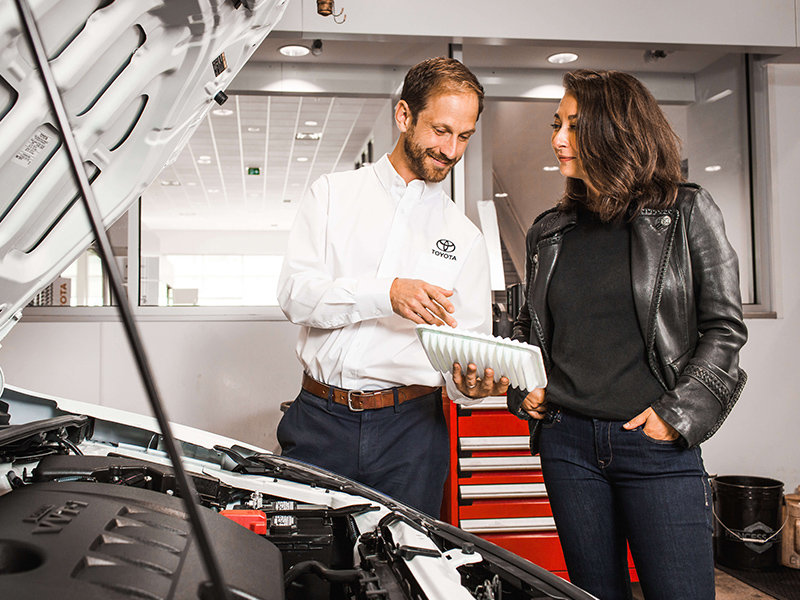
Together, we’re keeping our community on the move.
We’re proud to partner with The Parkside Centre, a vibrant senior community hub that brings life to downtown Sudbury. From crafts and workshops to...
Read more

Owning a Toyota vehicle comes with its perks, but also its responsibilities. One of the key aspects of ensuring the longevity and performance of your Toyota is regular maintenance. This is particularly true for Toyota's innovative line of hybrid and plug-in hybrid vehicles, which feature sophisticated technology designed to enhance efficiency and minimize environmental impact. In this article, we will explore some of the most frequently asked questions about maintaining Toyota hybrid vehicles, including the differences between traditional hybrid and plug-in hybrid powertrains.
Toyota offers a range of hybrid powertrains to cater to different driving needs and preferences. The traditional hybrid vehicles, such as the Toyota Corolla Hybrid, Camry Hybrid, and Highlander Hybrid, utilize a powertrain that combines an internal combustion engine with one or more electric motors. These hybrids automatically recharge their batteries through regenerative braking and by running the engine, thus eliminating the need for external charging.
On the other hand, plug-in hybrid models like the Toyota RAV4 Prime and Prius Prime include larger batteries that can be charged externally, allowing them to run significant distances on electric power alone before switching to hybrid mode. This capability makes plug-in hybrids an excellent bridge between traditional hybrids and fully electric vehicles, offering both extended electric range and the flexibility of a gasoline engine for longer trips.
Yes, both hybrid and plug-in hybrid vehicles require oil changes. The internal combustion component of these vehicles functions similarly to that of traditional gasoline vehicles, necessitating regular oil changes to maintain engine health and efficiency.
The oil change intervals for Toyota hybrids and plug-in hybrids are similar to those of their traditional gasoline counterparts. This uniformity simplifies maintenance routines for Toyota owners and ensures that the vehicles maintain optimal performance. For instance, the maintenance schedule for both the Toyota Corolla and the Corolla Hybrid is structured around the same intervals:
This schedule repeats, ensuring that both hybrid and traditional engines receive the necessary maintenance without additional or specialized scheduling. Similarly, the Toyota RAV4 Prime, a plug-in hybrid, follows the same service intervals as the RAV4 equipped with the traditional 2.5-litre engine.
While hybrid vehicles, including Toyota's hybrid lineup, utilize regenerative braking which helps to reduce wear on traditional brake components, they still require regular brake maintenance. Regenerative braking captures the vehicle's kinetic energy during braking and converts it into electrical energy to recharge the battery. This process reduces the stress on the mechanical brake system but doesn't eliminate the need for traditional brake system maintenance.
It's important for Toyota hybrid vehicle owners to adhere to the recommended maintenance schedule for brake inspections. This includes checking the brake pads, rotors, and fluid levels. Due to the reduced wear from regenerative braking, some hybrid vehicles may experience longer intervals between brake pad replacements compared to non-hybrid vehicles. However, regular inspections are crucial to ensure the braking system remains in good working condition.
There is a common misconception that hybrid vehicles are more expensive to maintain than their gasoline counterparts. In reality, while the initial cost of a hybrid vehicle might be higher due to the advanced technology and components, the long-term maintenance costs can be comparable to, or even lower than, those of traditional vehicles. Toyota hybrids benefit from the efficiencies provided by regenerative braking and typically have fewer moving parts in the engine, which can reduce the likelihood of mechanical failures and lower maintenance costs over the life of the vehicle.
Toyota hybrid batteries are designed to last for the life of the vehicle and generally do not require regular maintenance. These batteries are covered by a substantial manufacturer's warranty, reflecting their durability and long-term reliability. For instance, routine maintenance for the hybrid battery itself isn't necessary, but it is crucial to be aware of the vehicle's overall health and any diagnostic alerts related to the battery system. Many modern Toyota hybrids come equipped with diagnostic tools that help monitor the health of the battery, and periodic checks are advisable to ensure everything is functioning as expected.
Toyota hybrid trucks, such as those equipped with hybrid powertrains, are designed to handle tougher tasks and environments while still benefiting from hybrid technology efficiencies. The maintenance for hybrid trucks isn’t significantly different from that of regular hybrid vehicles or their traditional counterparts. Owners should follow the recommended service schedule that includes regular checks typical for any vehicle, such as oil changes, brake inspections, and tire rotations, alongside any specific checks recommended for the hybrid system components.
Maintaining a Toyota hybrid or plug-in hybrid vehicle involves adherence to the recommended maintenance schedules that are quite similar to those of traditional gasoline vehicles. These schedules help ensure all components, including those specific to hybrid technology, are operating efficiently. While hybrids do contain advanced technology, Toyota has designed these vehicles to be as maintenance-friendly as possible, keeping ownership costs reasonable and ensuring reliability across various vehicle models, from sedans to trucks. Thus, Toyota owners can enjoy the benefits of hybrid technology without undue concern over maintenance complexity or costs.

Together, we’re keeping our community on the move.
We’re proud to partner with The Parkside Centre, a vibrant senior community hub that brings life to downtown Sudbury. From crafts and workshops to...
Read more